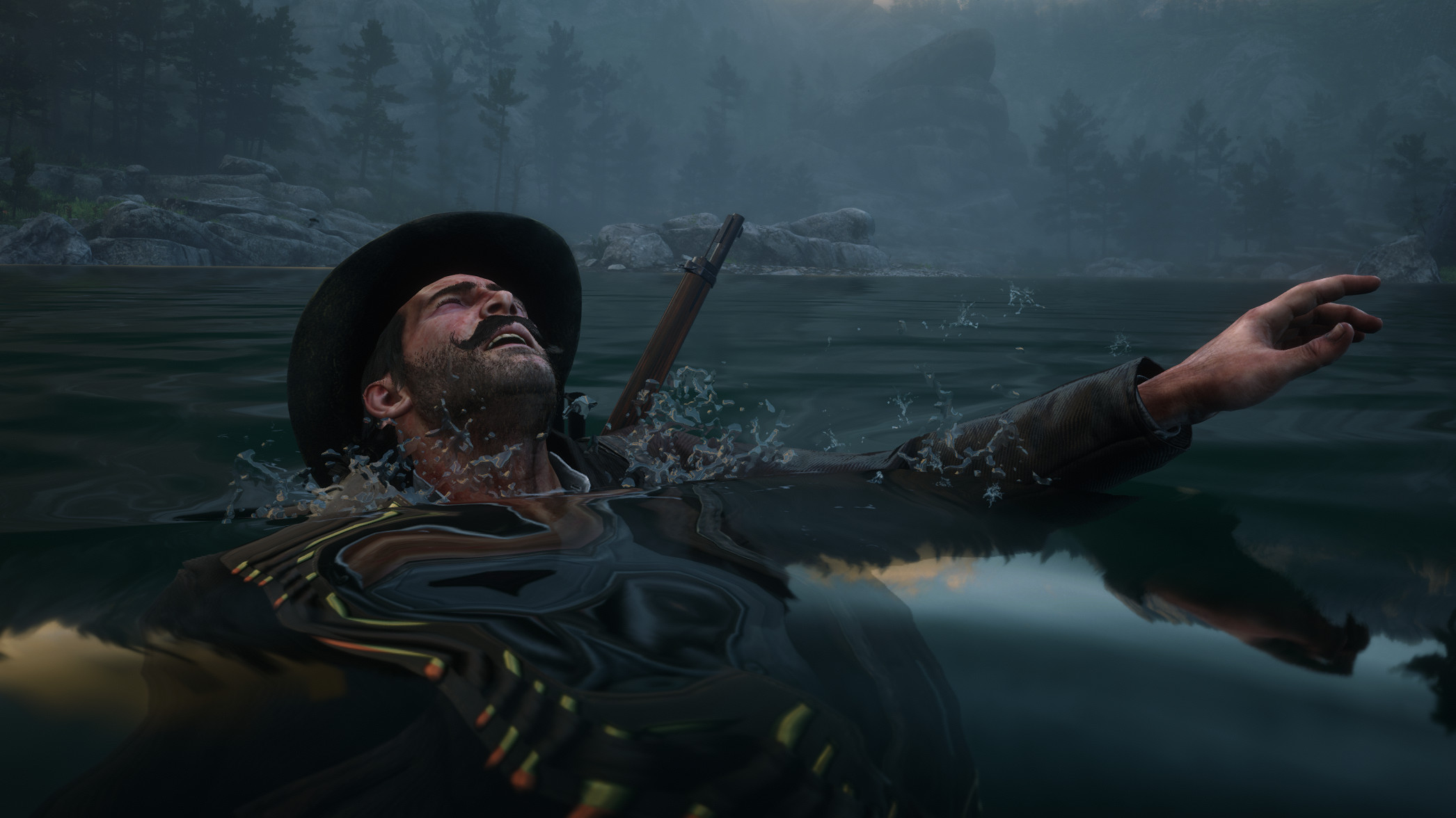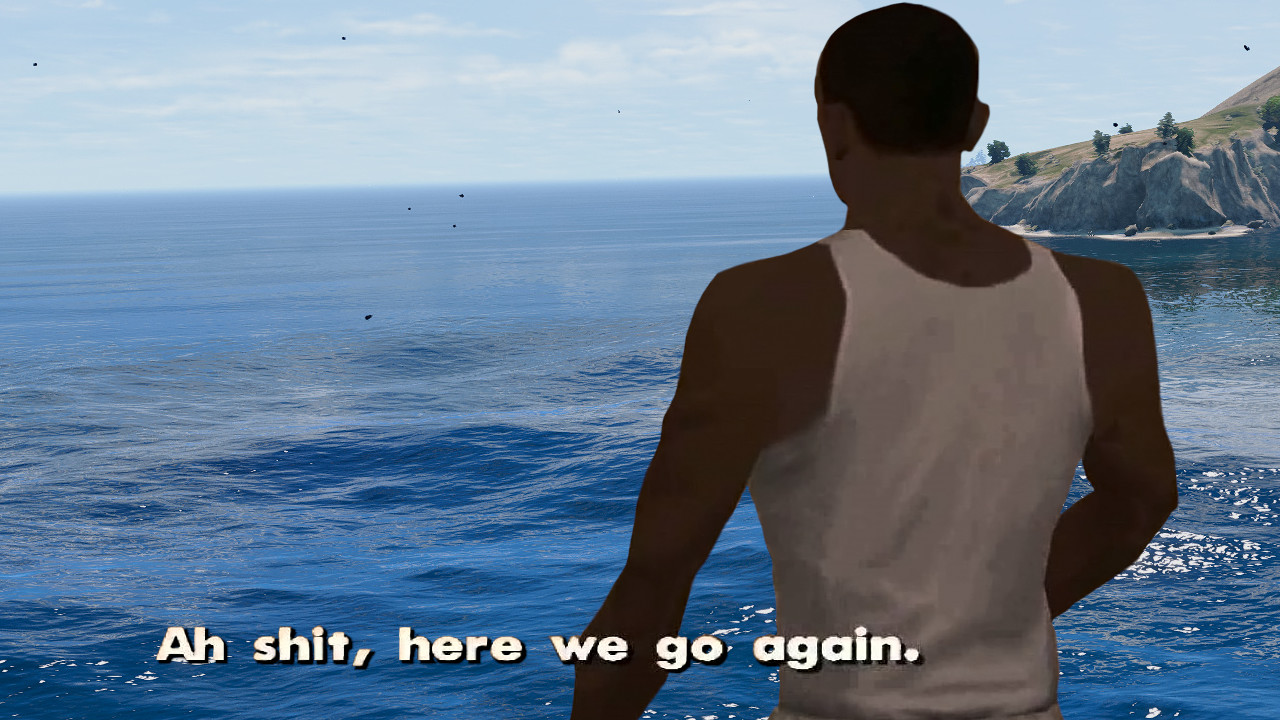Swimming in games sucks
It's a guaranteed fun-killer every time.

The predictable video game mechanics are having a party. Crafting System has brought his own homebrew keg. Instafail Stealth Segment shared a flan before retiring to the corner to ignore everyone. Turret Section is starting a game of beer pong. The doorbell rings! Oh no. It's Swimming. He's brought his guitar, homemade cottage cheese, and his uncle, who's had enough of snowflakes and is just telling it like it is.
The party might not be ruined—Quick Time Event is about to backflip off the roof, which will be fun no matter how it goes—but there's a morale-sucking danger zone that didn't exist before Swimming arrived.
This is precisely what we experience in games. Well, perhaps not precisely, although I would play that game. But swimming almost always feels at odds with the rhythm of a game. One moment you're rumbling towards the next action scene to do something you love. Then you're lost in a murky void, watching your oxygen meter, no longer cognisant of which way is up or down. Put a dollar in the jar if you thought about holding your breath IRL until you pass out.
The problem is that swimming is rarely fun. Almost never. It's a wetter, slower, shittier version of walking, and walking isn't exactly peak videogame action (no offense, Gone Home). The ability to move up and down underwater rarely compensates for the inherent tedium. You can't fight properly. You can't sprint. It's harder to see. And the constant, nagging, low-level anxiety about drowning means you can't even stop to enjoy the kelp.
Swimming is like trying to secretly read a colleague's emails while wearing boxing gloves and a pair of tights over your head, and you should feel equally guilty about enjoying either.

The revulsion is strongest when swimming sections appear in a game that doesn't need them, like finding a human tooth in a milkshake. By necessity that means that games about swimming get a free pass. You're okay, Abzu, with your blissful ocean currents and attentive, doglike shark. Subnautica, too, is allowed to live—without swimming you'd just be a bobbing simulator (presumably called 'Nautica'). It's the games that fecklessly insert swimming into otherwise terrestrial experiences that are the most hateful.
Any open world game attempting to create a realistic, relatable world requires water. But if it's realism we care about, perhaps swimming in a suit of armour should be impossible. Maybe we should have to trudge upstream until we find a bridge or fallen log, instilling within us a newfound appreciation for mankind's mastery of crossing things.
Keep up to date with the most important stories and the best deals, as picked by the PC Gamer team.
Instead, the likes of The Elder Scrolls let us splash about in icy, unmodded waters without the merest suggestion of hypothermia. And the actual process of swimming always disappoints. All that time and effort invested into letting players realistically navigate an underwater space often translates to, 'push forward to doggy paddle, press jump to doggy paddle slightly faster.' There's rarely a sense of being submerged in a physical substance—more that you're suspended in a void of inconvenience.
Where's the floating? The splashing? The holding your nose while you try to do a forward roll? Instead of being a place to explore, water in games is a place to escape from.
At least riding the rapids down Skyrim's waterfalls is fun. But the real villains here are the submerged caverns and sprawling coastlines. How many hours have we lost to their desaturated, claustrophobic depths, confused, cold, wet, bored, and bothered by slaughterfish?
My particular swimming low point belongs to another Elder Scrolls game, Morrowind. I fired it up expecting dash, heroism, escapism—a mushroom-flavoured accompaniment to Peter Jackson's Lord of the Rings trilogy. It delivered all that and more, but not before I spent 20 numbing minutes searching for a lost ring in a pond the size of a belly button. It was the quest equivalent of pushing my face into a cold puddle, made worse by the fact the ring's owner tried to kill me immediately after I retrieved it. The Unofficial Elder Scrolls Pages wiki for this quest is especially revealing: a screencap shows an unbroken grey murk with the caption, 'the ring is hard to see.' Yes. Yes, it is. Perhaps it's this Pavlovian experience that's conditioned me to hate swimming in every game.
Games can't even let me drown with dignity. Perhaps healing potions are inherently stupid, but I can understand the fantasy logic: I sustain an injury and the magic warlock juice knits the bones and mends the wounds. But why can I use healing potions to undrown myself? What's happening to the water in my lungs? Is the potion sending fresh oxygen to my brain? Much like you should never spend time alone with someone who tells you there's a fine line between madness and genius, let's remind ourselves that drowning and breathing are not two sides of the same Septim.
Swimming in games is so uniformly wretched that finding ways to defeat or exploit it feels like righteously thumbing your nose at the elements. Being able to walk on water in World of Warcraft, for example, is a triumph; Few things delight like casually strolling across the waves like a 400-pound Tauren Jesus, safe from whatever aquatic inconveniences lurk beneath.
That's the way, Geralt
The inherent shitness of swimming can even be used practically. Players on competitive Minecraft servers build underwater bases as a protective tactic, because it's so boring and inconvenient underwater that nobody ever bothers to attack you. It's like building a castle wall out of shopping channels, surrounded by a moat filled with things you dreamed about last night. Besieging armies would lose the will to live long before you ran out of supplies.
Do any games get it right? Yes, but only when they can lean into swimming's pube-clogged drain of awfulness. Friday the 13th is a fun example. Fleeing into the lake feels like a brilliant idea the first time you do it. Jason is slow on land so he'll be useless in the water, right? And it's around this moment you remember the shock ending of the first movie, where a sodden Voorhees Jr. bursts forth and drags the heroine underwater. Suddenly, every second you spend floating along like an unflushable turd feels like a lifetime. And even then, it's predicated on the experience of swimming being godawful.
This article, then, is dedicated to all those pristine hydrophobic games: a salute to the ones that force us to stay on land no matter how superhuman our avatars are. To the Metal Gear Solid 5s, the Dark Souls, the Dragon Age Inquisitions. To the games that are better for offering us nothing more aquatic than a genteel paddle in our rolled-up army fatigues.
You gave us less than the other games and we're happier (and drier) because of it.


